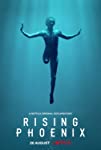Eye For Film >> Movies >> Rising Phoenix (2020) Film Review
Rising Phoenix
Reviewed by: Jennie Kermode

The modern Olympic Games date back to 1859, with roots in ancient history. The Paralympic Games date back to 1948. Even today, the latter are typically poorly funded and don't receive anything like as much media attention, Even so, they play an important role, giving disabled athletes something to strive for and helping the general public to see disabled people around them as individuals with real potential.
A history of the Paralympic Games has been a long time coming and directors Ian Bonhôte and Peter Ettedgui should be commended for taking it on. It's just a shame that they had to make the film they did. Whilst there is some important work here and its reflections on the past are often interesting, its treatment of disabled people in the present day is naïve, patronising and resoundingly twee.

This is disability storytelling for the 'you can can accomplish anything if you really believe!' school of thought, which is 1) obviously not true, and 2) very damaging to the many disabled people who depend on others accepting that there are things they can't do in order to access vital sources of help. After the Paralympic Games in England, there were several notorious cases of participants having their benefits taken away because they had been able to compete, with assessors refusing to acknowledge that being able to perform in a specific sport with a lot of support did not automatically mean being able to cook a meal or get in and out of the house without help. There's nary of whisper of that here - it's triumphalism all the way, with eyes on the prize and no thought given to the daily struggle many face just to stay alive.
There is no consideration, either, of the fact that the average disabled person is not more able to compete in the Paralympics than the average able-bodied person it in the Olympics; nor that the term 'disability' covers an enormous range of different situations and experiences. Disabled people are spoken about as if they're all potential medal-winners, and as if physical achievement is the only thing that really matters in life. One might allow a little more leeway for this latter point in a sports documentary and, indeed, there are some impressive physical feats on display, which will be the main reason for watching for some viewers. The tunnel vision at the heart of it, however, places this more in the tradition of Leni Riefenstahl than great modern sports documentarians like Asif Kapadia or Jimmy Chin.
If you can mentally draw back from the bombastic music and sentimental storytelling, you'll find some interesting biographical material on Ludwig Guttmann, the Jewish neurologist widely recognised as the founder of the event, with touching contributions from his daughter, Eva Loeffler, who remembers the effort involved in it all and hints at the significance of his vision, recognising humanity in people whom Western society had traditionally cast aside. Good use is made of archive footage and the focus on the importance of injured war veterans on changing attitudes segues nicely into a reflection on the Invictus Games of today. Still, the documentary's focus on success leaves little room for exploring the more commonplace reasons why sport is such an important lifeline for many people in this situation.
The stories of individual disabled athletes are not told often enough so here, too, there is something of value, though the cramming of diverse narratives into the same narrow overcoming-the-odds frame robs them of a lot of their colour and human interest. The film is at its most successful when actually replaying footage of them in action. It's just a shame that it seems less interested in what they do than in the fact that they're winners, less interested in them as people than as examples of good citizens who may lack some of the advantages that others enjoy but are still able to play the game.
Reviewed on: 20 Feb 2021

















